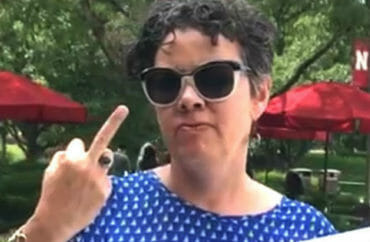
Also protects ‘counter demonstrations’ that don’t heckle
As free speech on college campuses faces continued attack, Nebraska is taking steps to ensure its own public colleges don’t join the censorship parade.
Two bills in the unicameral Legislature dealing with the free speech and press rights of students were introduced last month.
Republican Sen. Steve Halloran introduced the Higher Education Free Speech Accountability Act (LB-718), which would protect free speech rights for students in Nebraska public higher education.
LB-886, which has no formal name, is sponsored by Democratic Sen. Adam Morfeld. It would protect student journalism rights in both K-12 and higher education in the state.
Morfeld told The College Fix in a phone interview he had a “personal interest” in the bill he introduced: “When I was a high school student in South Dakota, I had a high school principal censor a publication I created.”
The bills are under consideration on a major anniversary in the history of student media. Thirty years ago last month, the Supreme Court gave administrators broad leeway to censor student media in its Hazelwood ruling.
MORE: UNL shuts down pro-capitalism club’s ‘propaganda’
Wrote my 1st story as a H.S. journalist on teen drinking in ‘94. But many students are unable to cover sensitive topics. #sad #CureHazelwood pic.twitter.com/YwiLAYOeCj
— Val Kibler, JEA (@jeapresident) January 31, 2018
‘Increased sanctions for repeat violators’
Both Nebraska bills followed controversy last year at the University of Nebraska-Lincoln, where a graduate student and professor protested a student who was tabling for the school’s Turning Point USA chapter.
A university employee also told the student, Kaitlyn Mullen, she couldn’t hand out the group’s pro-capitalism “propaganda” outside the school’s free-speech zone.
The university stripped teaching duties from the grad student, Courtney Lawton, after a recording of her went viral. She had referred to Mullen as a “neo-fascist” and “Becky,” a slur for “white woman.” Lawton’s contract was not renewed, and the incident led the school’s news director to resign as well.
Last week the university system’s regents approved a four-page “Commitment to Free Expression” statement that promises to uphold students’ First Amendment rights and to actively promote freedom of expression.
MORE: UNL strips teaching duties from Lawton
Sen. Halloran’s bill would functionally prohibit Nebraska’s public colleges from forcing students to use free-speech zones if they want to express themselves, as Turning Point USA was told last summer.
It would designate public areas on campus “traditional public forums, open on the same terms to any speaker,” and bar colleges from disinviting speakers invited by students or faculty.
The University of Nebraska regents would have to adopt a statement specifying that “it is not the proper role of the campus to shield individuals from speech protected by the First Amendment” – even speech that some “find unwelcome, disagreeable, or even deeply offensive.”
The bill also requires colleges to sanction students and employees whose protests and demonstrations “materially and substantially infringe upon the rights of others to engage in or listen to expressive activity … including increased sanctions for repeat violators.”
To ensure free speech is enforced, the bill requires the regents to create a Committee on Free Expression composed of faculty, regents and students. Each year it would submit a report on public campus incidents where free expression was disturbed.
University promises aren’t enough
In an amendment he filed last week, Halloran expanded the scope of the bill beyond the University of Nebraska to state and community colleges. The revision also explicitly protected “counter demonstrations” as long as they don’t “materially and substantially” disrupt others’ activities or the functioning of the school.
“Putting this bill into law will permanently protect students’ free speech rights,” Joe Cohn, policy director for the Foundation for Individual Rights in Education, told The Fix in a phone interview. He testified in favor of the bill this week.
The group had pledged to work with Nebraska lawmakers to “refine the language” in the Halloran and Morfeld bills soon after they were introduced, “to ensure that student rights are best protected on campus.”
Halloran did not respond to repeated emails from The Fix throughout the second half of January. A staffer in Halloran’s office told The Fix Monday he might call back, but he has not.
MORE: UNL doesn’t renew contract for Lawton after she harasses student
The lawmaker argued for the continued relevance of his bill following the University of Nebraska’s statement on free expression at an Education Committee hearing Tuesday, the Omaha World-Herald reported.
Halloran offered another amendment – not yet added to the bill’s summary page – that he said “would leave more decisions about free speech policies to the college and university governing boards,” according to the World-Herald.
FIRE’s Cohn testified in favor of the bill and said the University of Nebraska has not “turned the corner to now be a bastion of free speech” simply because of its new statement on freedom of expression.
Another person testifying read a statement from Lawton, the sanctioned grad student, who accused Halloran of “lies and distortions” and said Republicans “believe in suppression of dissent.”
MORE: University of Illinois instructor assaults conservative students
Protections for their advisers, too
Sen. Morfeld’s bill would protect these rights for both K-12 and college students by designating school-sponsored media as public forums.
This means student journalists would be responsible for “determining the news, opinion, feature, sports, and advertising content of school-sponsored media” and not school administrators.
LB-886 would also protect their “student media advisers” from retaliation – including reassignment and transfer – for protecting their student journalists engaged in lawful activities or “refusing to infringe upon conduct” protected by the First Amendment.
Such advisers sometimes find themselves in the cross hairs of a dispute between their students and administrators. FIRE’s Cohn pointed to a 2016 incident where Nebraska’s Wayne State College removed the faculty adviser of the Wayne Stater after it published several articles critical of the administration, as Inside Higher Ed reported.
Morfeld told The Fix he has heard from students and advisers at some state colleges that administrators are trying to censor content. He’s confident the bill will obtain enough votes to get out of the Education Committee, which is considering it next week.
MORE: Rhode Island shields student journalists from censorship, retaliation
I just introduced the Student Journalist Protection Act (LB 886) to ensure young Nebraskans #FirstAmendment rights are protected! @SPLC @ACLU #FreePress
— Adam Morfeld (@Adam_Morfeld) January 8, 2018
The bill closely resembles the Student Press Law Center’s New Voices campaign, which seeks to persuade state lawmakers to give student journalists the rights they were denied in the Hazelwood ruling.
“Campus journalism is really important to developing good journalists,” FIRE’s Cohn told The Fix. “Bills like this ensure that campus journalists are treated with the same respect as other journalists without subjecting them to prior restraint.”
Cohn said that as a higher education-focused group, FIRE is neutral on the K-12 elements in Morfeld’s bill, but the organization is glad to see these bills advancing across the country.
He believes it is important to treat college journalists like adults and not children.
MORE: This pro-capitalism campus group beats back efforts to shut it down
IMAGE: Turning Point USA/YouTube
Like The College Fix on Facebook / Follow us on Twitter






Please join the conversation about our stories on Facebook, Twitter, Instagram, Reddit, MeWe, Rumble, Gab, Minds and Gettr.